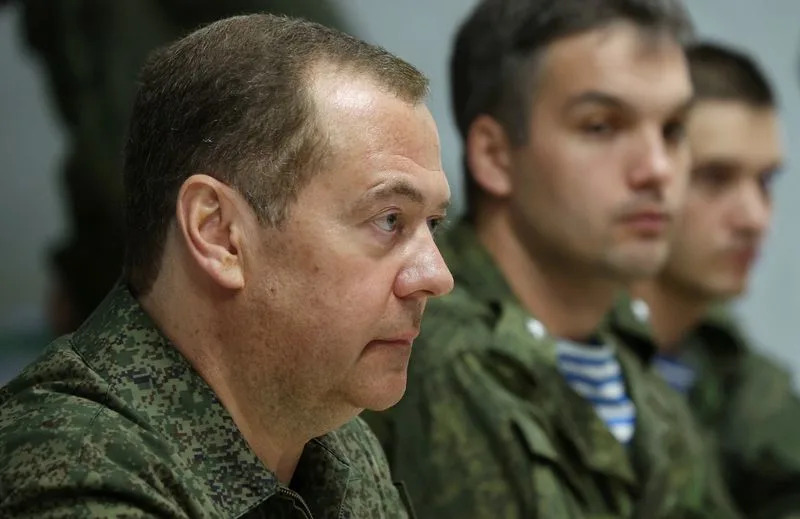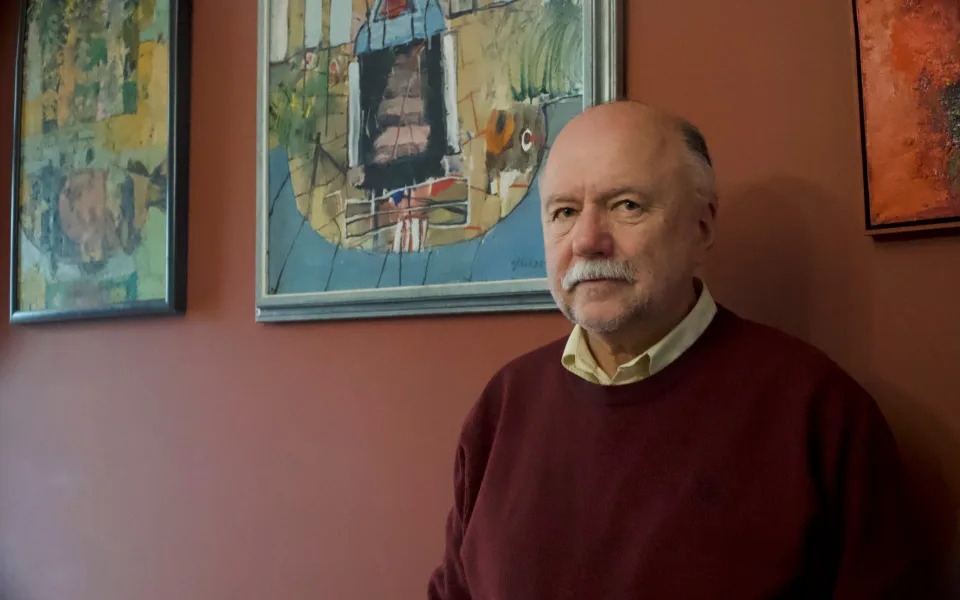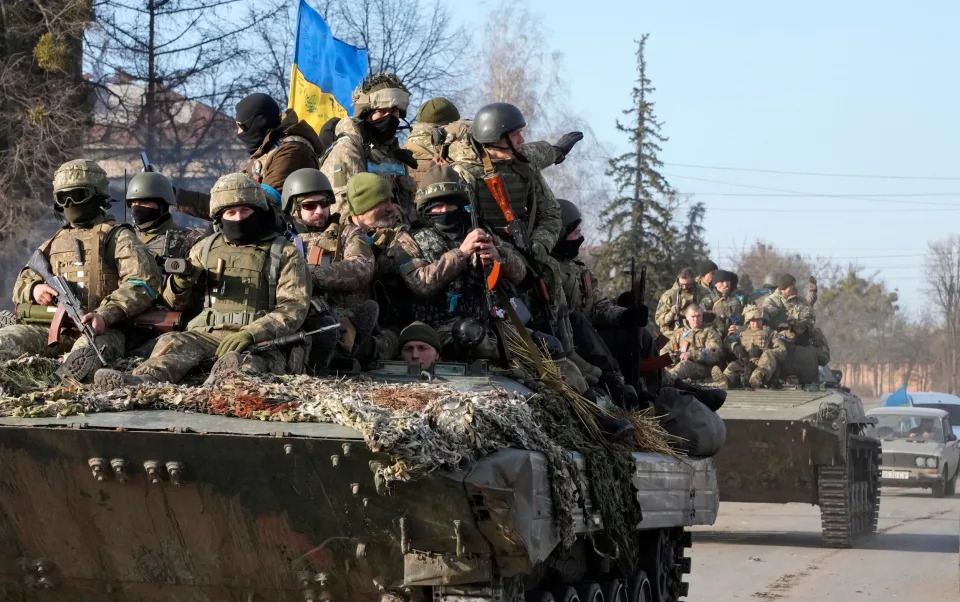Investigation: Why Ukraine is attacking Russian energy infrastructures
TIT FOR TAT
Lise Kiennemann
Mon, March 4, 2024

Ukrainian drone attacks on Russian energy infrastructures have been increasing since early January, with targets including a fuel export terminal and processing complex in Ust-Luga, a refinery in Tuapse and another in Volgograd. Our investigations revealed that at least eight sites have caught on fire after drone attacks. Ukraine is likely carrying out their attacks to weaken the Russian economy – and to show off its military power, says analyst and energy expert Benjamin Schmitt
Images that circulated online show firefighters working to stop the flames consuming a petrol depot in the eastern Russian village of Polevaya the night of February 14.
The fires were caused by Ukrainian drone attacks, according to Roman Starovoyt, the governor of Kursk, the oblast, or region, where Polevaya is located. Ukrainian outlet Kyiv Post also reported that the fires were caused by Ukrainian drones, stating that this information came from "sources from Ukraine’s Military Intelligence”. l
The drone attacks in Polevaya are not isolated. Moscow has been targeting Ukrainian energy infrastructure for some time and, now, Ukraine is striking back. They’ve hit multiple Russian gas and petrol infrastructures in recent weeks.
In at least two other cases, Russia has claimed to foil a Ukrainian drone attack targeting Russian energy infrastructure.
Showing off Ukraine’s ability to strike
By hitting a target so far away, Ukraine is also demonstrating its potential to cause damage and destruction.
GREAT RUSSIAN CHAUVINISM & IMPERIALISM Putin ally says 'Ukraine is Russia' and historical territory needs to 'come home' Andrew Osborn Updated Mon, March 4, 2024  Russia's Security Council deputy head Medvedev meets military personnel in Ulyanovsk region By Andrew Osborn (Reuters) -Dmitry Medvedev, deputy chairman of Russia's Security Council and an ally of President Vladimir Putin, described Ukraine on Monday as part of Russia and said what he called historical parts of Russia needed to "come home." In a bellicose presentation that suggested Russia's military goals in Ukraine are far-reaching, Medvedev, who was Russia's president from 2008-2012, praised the Russian Empire and the Soviet Union and said Moscow would prosecute its "special military operation" until the Ukrainian leadership capitulated. "One of Ukraine's former leaders said at some point that Ukraine is not Russia," Medvedev, a hawk who diplomats say gives a flavour of the thinking inside the Kremlin, told a youth forum in the Black Sea city of Sochi. "That concept needs to disappear forever. Ukraine is definitely Russia," he said to applause. "Historic parts of the country need to come home." There was no immediate reaction from Kyiv. Ukrainian officials have repeatedly accused Medvedev and other top Russian officials of waging an illegal war of conquest and said Ukraine and its people are distinct from Russia and Russians. Medvedev was speaking in front of a giant map of Ukraine showing the country as a much smaller landlocked rump of land than its internationally recognised territory. The map appeared to depict a scenario where Ukraine would be squeezed up against Poland, with Kyiv remaining its capital, but Russia would be in control of a swath of Ukrainian cities and its east, south and entire Black Sea coastline. Russia has the initiative on the battlefield and controls just under one fifth of Ukrainian territory, which it claims as its own, but the scenario is sharply different from the situation on the ground. PEACE TALKS RULED OUT Medvedev, who the West once saw as a liberal reformer, said Russia's "geostrategic space" was indivisible from Ukraine and that any attempt to change that by force was doomed. "All our adversaries need to understand once and for all a simple fact: that the territories on both banks of the Dnipro River (which bisects Ukraine) are an integral part of Russia's strategic and historical borders," he said. Medvedev ruled out peace talks with the current Ukrainian leadership. He said any future Ukrainian government that wanted talks would need to recognise what he called the new reality. Commenting on East-West relations, Medvedev said ties between Moscow and Washington were now worse than during the 1962 Cuban missile crisis when the two countries appeared on the brink of nuclear conflict. "I will say one bitter thing," he said. "The current situation is much worse than the one in 1962. This is a fully fledged war against Russia with American weapons and with the participation of American special forces and American advisers. That's how it is." (Reporting by Reuters, Writing by Andrew Osborn, Editing by Timothy Heritage) Andrey Kurkov: ‘I expected Putin to escalate – but not to bomb us like Hitler’ David Knowles Sun, March 3, 2024  Mightier pen: Andrey Kurkov at home in Kyiv - Jack Leather In 2024, two years on from the start of the full-scale invasion of his country, Andrey Kurkov has no illusions about Russia’s intentions in Ukraine and what it means for the West. “Putin will not give up while he’s alive. If he manages to destroy Ukraine, he will fight against the West in Moldova, in Lithuania, in Poland. And European leaders and politicians should understand that this is a potential Third World War. And it will reshape Europe and the European Union.” We meet in Kurkov’s flat in central Kyiv. One of its high windows is crisscrossed with tape, a technique used to minimise the impact of shattering glass after a missile strike or shelling. He tells me about the dinner he made for close friends on the night before the invasion. “I cooked borscht, and we were joking. I was saying that this is probably the last borscht in Kyiv. After midnight, when we were saying goodbye to each other, suddenly everybody started exchanging mobile numbers, just in case. And I took photos of this moment. All the faces of my guests were very worried and very concerned, and there were no smiles at all.” By morning, Russia’s war of aggression had started in earnest. Tanks and troops were rolling across the border and missiles were striking major cities. For Kurkov, the full-scale invasion was a shock. A veteran of travelling to the front lines, the author was no stranger to death and violence, but it was the size of the invasion that surprised him. “It was clear that this frozen war is not going to stay like this forever. Russia will never be happy with Crimea. For me, it was no surprise that a full-scale invasion started, although I didn’t expect this scale of it. I was expecting an escalation in Donbas. I wasn’t expecting a 1941-style of bombing the whole country, like Hitler did.” Now 62, with a neat moustache and bright eyes, Kurkov is at the height of his fame. Born in St Petersburg, he had a string of eclectic jobs, including prison warder and screenwriter, before gaining international success as a novelist. His first, translated into English as Death and the Penguin, became a worldwide bestseller and was translated into 30 languages. Often surreal, bitingly funny and eerily prescient, Kurkov’s work reflects the profound cultural changes in Ukraine and Russia over the past 30 years. Even prior to the Russian invasion of Ukraine (he and his English wife, Elizabeth, escaped to their house in the country initially, before returning to the capital), Kurkov had written about working out how to live through a war.  'European leaders must realise that this is a potential Third World War' - AP Photo/Efrem Lukatsky In his 2018 novel Grey Bees, his pro-Ukrainian protagonist, Sergey Sergeyich, is caught up in the Donbas war. His village lies near-abandoned as Ukrainian and Russian forces shell each other over the disputed “grey zone”, and Sergeyich must walk a delicate line between two rival armies and his “frenemy” in the village. However, Kurkov tells me that the war curbed his ability to write fiction. He abandoned a new novel for which he had written 70 pages. “On the first day, I almost couldn’t write anything. Just a couple of sentences in the diary. For me, writing is pleasure. And when I write, I am living in two worlds, the world I created for the novel and the world with my real friends, my real family and real problems. So my imaginary life was immediately removed from me.” (His latest novel, The Silver Bone, which is published in the UK on Tuesday, was written before the war.) Following the start of the war, Kurkov threw himself into journalism instead, writing hundreds of articles for publications across the globe. The full-scale invasion also changed how the people of Ukraine thought about the Russian language.  A local civilian in Ocheretyne, a village near the Avdiivka district, recently claimed by Russian troops in Donbas - Narciso Contreras/Anadolu via Getty Images Although the Ukrainian language is historically oppressed (in the 1930s, the Soviet authorities carried out a brutal purge of Ukrainian culture and language), more and more people have started speaking Ukrainian in recent years, and many are bilingual. Since the 2022 full-scale invasion, some have even abandoned Russian altogether, rejecting any association with the “aggressor” country. Kurkov, whose mother tongue is Russian, tells me: “My books are now not published in Russian, because bookshops in Ukraine don’t want to sell books in Russian, because Putin turned the language into the language of the enemy, in spite of the fact that 30 to 40 per cent of Ukrainians are Russian-speakers. Now, lots of people are changing language, switching to Ukrainian.” Kurkov’s own works were banned in Russia in 2014, the year he first began to go to the front lines. But, he says: “There will be a niche for Russian-language literature. I don’t know if it will be a ghetto, or whether it will be a kind of club, closed-community literature. But it will survive.” You can listen to David Knowles interview Andrey Kurkov on Ukraine: the Latest, The Telegraph’s daily podcast on war in Ukraine, using the audio player at the top of this article or on Apple Podcasts, Spotify, or your favourite podcast app. |
No comments:
Post a Comment